2013 ASECAP Study and Information Days
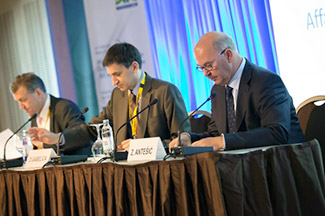
The 41st edition of the annual ASECAP Study and Information Days took place in Dubrovnik, Croatia from 26 to 28 May 2013. Traditionally successful conference was hosted under the theme: "Promoting Sustainable Growth – The Role of the Toll Roads" and brought together about 200 professionals, panellists from the road infrastructure sector across Europe and beyond who had the opportunity to present their companies, exchange experiences and learn about the latest trends and practices in the fields of tolling and concessions, road safety and sustainability and intelligent transport systems.
This year for the first time the conference followed a new format, so the first day of discussions (Monday 27 May) was therefore marked by subsequent plenary sessions with a full day of expert presentations followed by questions and answers and the second day (Tuesday 28 May) was dedicated to debate about the current economic situation in the EU and the role of toll roads as a lasting key factor for growth from the side of high-level EU decision makers and ASECAP personalities.
Welcome address and opening speech was given by ASECAP President, Klaus Schierhackl and HUKA President David Gabelica and also by the Deputy Minister of Maritime Affairs, Transport and Infrastructure, Zdenko Antešić who expressed satisfaction by the significant number of international participants which reflects not just the importance of the topics, but the strong ties and partnership within the transport community. Z. Antešić, in his speech reflected on the importance and challenges of sustainable growth especially in these times of financial crisis.
"Having said all this, it gives me a great pleasure to see all of you showing involvement and commitment to a manner of operation and development that has respect for the world, now and in the future, more efficient in economic terms, more humane, more socially equitable and more sustainable", he added.
Technical presentations were preceded by the implementation of Memorandum of Understanding between ASECAP and IBTTA: A joint tolling declaration designed to support a wider application of tolling policies throughout Europe and North America, support mobility and economic growth.
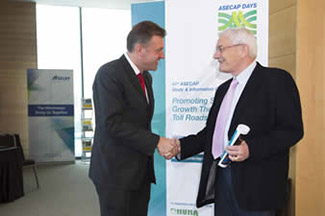
ASECAP president, Klaus Schierhackl, noted, "The proper application of tolling systems allows us to ensure the quality of our networks. It enables us to offer the high levels of service that our customers, and society as a whole, expect from us. Bearing in mind the huge investment needs in Europe and North America, the time is right to unlock the full potential of the well-established cooperation between ASECAP and IBTTA: traffic fluidity, safety and sustainable mobility by and large need to be financed as efficiently and equitably as possible."
Robert Horr, president of IBTTA, commented, "With growing budget shortfalls and increasing transportation infrastructure needs across the world, tolling is quickly becoming a powerful tool to fill the transportation infrastructure funding gap. This joint agreement demonstrates the strong bond among toll facility owners and operators across two continents, committed to articulating and advancing the benefits of tolling. We look forward to working together to support a proven, reliable method of transportation funding and to strengthening the road infrastructure around the world."
Declaration touts six advantages of tolls over taxes for roads:
- "Scarcity" of tax revenues.
- More sustainable as fuel revenues are declining: "Tolling embraces the user pays principle much more effectively than a tax on fuel".
- To the extent roads are tolled tax revenues can go to support other important government needs - education, social security, defence etc.
- Tolls are fairest and the best way to fund roads and can't be gamed by across-border shifting of taxes.
- Manage traffic in dense urban areas with variable rates.
- By enabling good roads to be built faster and better they enhance economic growth.
During the signing of the international agreement, ASECAP and IBTTA also released a new fact sheet titled, United States and Europe Tolling Brief, which highlights facts and figures on how tolling supports mobility and economic growth throughout the U.S. and Europe.
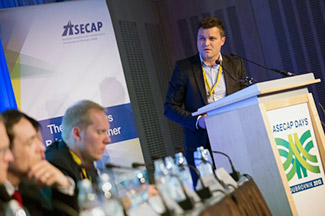
Three technical sessions were held with a full day of expert presentations followed by questions and answers on subjects falling under the responsibility of ASECAP’s different Permanent Committees (COPERs), i.e.:
- COPER I: tolling and concessions
- COPER II: road safety, security and sustainability
- COPER III: Intelligent Transport Systems
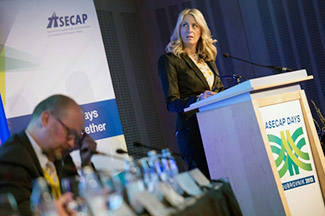
This year, Croatia was represented by companies Autocesta Rijeka-Zagreb Ltd. and Bina Istra Ltd. In technical session nb.1: Road safety, security and sustainability, Tatjana Matković, Head engineer in Investment Maintenance and Environmental Protection Sector presented Impact of construction of Rijeka-Zagreb motorway as a dual carriageway to traffic safety improvement while Christian Santaleza, director of Bina Istra operation and maintenance LLC in technical session nb.3: Tolling and Concessions presented automatic toll collection on the Istrian Y motorway.
On the second day of the conference (Tuesday 28 May) the various developments in the EU road transport sector were examined during half a day from a truly political angle. Besides ASECAP personalities, K. Schierhackl (ASFINAG), J. Mesqui (ASFA), presentations were also given by C. Economou, Deputy Head of Unit "Land Transport", European Commission and David Gabelica, President of HUKA and general manager of Bina Istra Ltd. who all tried to give their answers to the question Is the crisis over and their opinion of the role of toll roads as a lasting key factor for green mobility and sustainable growth.
K. Dionelis, ASEAP General Secretary passed a message from the representative of EIB, who unfortunately was not able to attend the conference. Message stated that the mutual cooperation between EIB and European Commission is vital for overcoming the crisis and that the transport sector is the key element for the future growth. A proper infrastructure is important and in order to build it, there are to sources available for funding: public money which is in scarcity and the users. Application of user pays and polluter pays principles will get us to future orientations how to build, toll and maintain infrastructure. EIB fully supports and believes more initiatives are needed for less risky money to appear, careful planning and selection of only the best projects is needed. Private sector involvement has to have a more active role which means more PPPs, assessment of future orientations and delivering value for money. Long term prosperity depends on Europe having transportation system, more transportation and infrastructure is needed, the question remains how to finance it.
C. Economou, from the European Commission’s Directorate-General for Mobility and Transport underlined the role that ASECAP plays in relation to the development of EU transport policy and added that "charging for the use of infrastructure and internalizing the external transport costs in accordance with the polluter pays principle are key factors of the EU policy orientations. A road charging package that the Commission is preparing will aim at further improving the EU instruments that are available for this".
D. Gabelica, President of HUKA in his presentation focused on Croatia and gave a small overview of the economy in the country and the way Croatia finances infrastructure. Having in mind the upcoming admission of Croatia to the EU he presented few macroeconomic indicators (GDP, interest rates, public debt), gave a short description of the banking system and specificities of the road network (very small traffic on motorways, sharp legal framework in the past, very developed secondary network (national and regional roads which explains small traffic on motorways), current situation of stopped infrastructure developments due to public deficit and the increase of the margins on public debt. As contemplated solutions to rescue the industry he pointed out 10 Billion € from cohesion funds available for Croatia, adaptation of the new legal framework by the state (new concession law that offers longer concession periods and more flexibility), privatisation of public network, implementation of restrictions for trucks on the secondary network in order to make secondary network safer etc. The target of the state is to make the user pays.
J.Mesqui gave an overview of the situation in France where the traffic is also in decrease in the last two years and traffic of heavy vehicles has reached the level as in 2008/2009. He pointed out that France has a very strong and solid concession system which, even with the decrease in traffic, offers to government a stable tool to make investments that include employment and growth. France applies not only user pays but also polluter pays principle with green measures significantly increasing over the years. In 2009/2010 a proposal was made (the green package) to use the existing concession system, that is to finance environmental investments not included in the contracts through extensions of the contracts duration, without increasing of tolls. 5 concessionaires have signed agreements with the Government and were approved 1 year extension of the duration (1 Billion € new investments to realize in three years). At the moment, a new program is proposed and is under discussion with 3 Billion € new investments. J. Mesqui also specifically highlighted the fact that concessions are very efficient due to the fact they do not offer only investments and construction but also a service to the client. If there was no return to the users in terms of service, then the problems would occur. Concession system is successful because it is an earmarked system (user - polluter pays system).
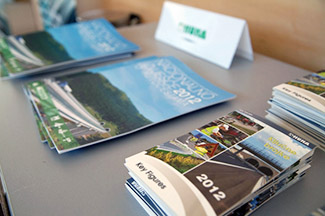
The second part of the final day was dedicated to presentation of REETS project – stepwise implementation of the European Electronic Tolling System. H. Resch, ASFINAG gave an overview of key events that have led to REETS project:
- April 2004: Directive 2004/52/EC: Directive provides for the Setting-up of a European Electronic Toll Service (EETS)
- October 2009: Decision 2009/750/EC of the Commission on the definition of the EETS and its technical elements (approved by Member States in the Toll Committee)
- October 2012: EETS to be available for vehicles exceeding 3,5 tonnes and coaches (Obligation of Member States according to Art 3 (4) Directive 2004/52/EC)
- August 2012: Commission suggests "a stepwise approach"
- Regional approach to kick-start deployment of EETS (REETS)
- Indication of provision of TEN-Funding for REETS-projects
- September 2012: High level meeting of major stakeholders with EU Commission
- ASFINAG (Klaus Schierhackl) takes over coordination of a proposal for a REETS project
- November 29, 2012: TEN-T call for REETS-proposals
- March 26, 2013: Submission Proposals REETS-TEN
Administrative set up is still in preparation, expected start is beginning of September 2013. The project will have two main phases; analyze phase that shall be concluded by this time next year and deployment phase that includes information platform (single access point for interested EETS providers), testing and implementation. The last one, implementation, is depending on external factors , responsibility moves from the REETS Consortium to contribution between Toll Chargers and Service Providers. REETS project has a great importance since it represents the kick start of EETS in Europe. A web site with the results of the project will be published and in planning is organisation of REETS Days stakeholder advisory groups, workshops, seminars etc.
European Commission gave a big encouragement to REETS and has pointed out that finally there is a project which shows commitments to have some results and will increase the acceptability of the public who asked for this service.
During its session meeting held on 26 May 2013 in Dubrovnik, the ASECAP Steering Committee elected Mr Jean Mesqui (Executive Director, ASFA, France) as new ASECAP President for the period 2013-2014, taking over from Mr Klaus Schierhackl (CFO, ASFINAG, Austria).
Next, 42nd ASECAP Study and Information Days will take place in the centre of Athens from 25 to 27 May 2014.
The event's proceedings (presentations, speeches, press coverage and photos are available on the website of the 2013 ASECAP Days